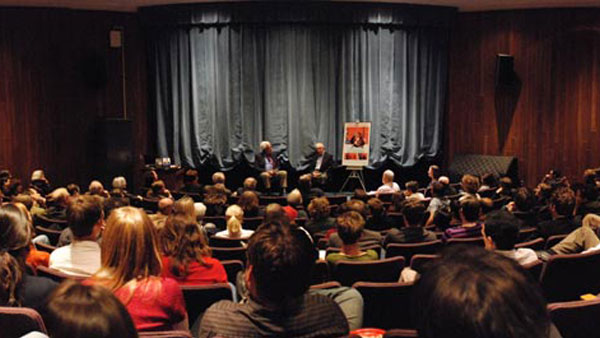
(Photo credit: Criterion.com)
Earlier this week, the Cinematheque released their summer programming schedule, and most reactions hovered somewhere between tepid excitement and frothing hyperbole.
The one response directed at UW’s film group you likely didn’t see however was surprise. Since 1998, Cinematheque has been a purveyor of quality film exhibition in Madison but in years since, the institution has become more than just a haven for the city’s cinephiles. Compared to the diaspora of Madison’s music scene (and certainly the likes of dubiously-sponsored sausage expos), the Cinematheque is just about the best thing Madison culture has going for it.
Yeah, yeah, yeah. “Best” is subjective. But where else in Madison are you guaranteed a cultural heterogeneity that spans the likes of RoboCop and A Girl in Every Port? Much less for the low, low price of absolutely nothing? Yes, Cinematheque is a gracious recipient of funding, specifically the Anonymous Fund and the Alumni Assocation’s Brittingham Foundation in addition to support from the Chazen. Cinematheque isn’t dependent on ticket sales or concessions, so it’s fair to argue their financial security is precisely why they can afford to make riskier programming selections — e.g. screening the poetic ghost stories of Kwaidan in an international horror series, including a showcase of restored avant-garde films — and get away with it. (For the record, Cinematheque screened both of those and Cinematheque got away with both of those.)
Madison’s prestige cinema program still advertises itself as if it’s entirely dependent on putting butts in the seats. A strong social media presence (one that this site has undoubtedly benefited from) on Twitter and Facebook provides timely information on additions or (in the rare case) changes to programming. Compare that to the likes of @sundancemadison, whose feed has remained barren since April 4. Tweeting out reminders that your 7:00p screening of Ingmar Bergman’s Smiles of a Summer Night is still at 7:00p seems hardly praiseworthy, but it’s a godsend in a town with such an iffy track record of events promotion.
I would venture to guess it’s part of why the release of Cinematheque’s summer schedule received as much coverage from Madison arts outlets as it did. (See: Arts Extract, Capital Times, Madison Film Forum, Rob Thomas’ Madison Movie blog)
Let’s face it, it’s also because of all the “new.” Richard Ayode’s mind-bending thriller The Double and a two-part (!) screening of Lars von Trier’s Nymphomaniac aren’t just free movies; they’re free Madison premieres. Cinematheque brings films to Madison outside the New York-Los Angeles-Chicago distribution trifecta, films relegated to On Demand releases, films Monsieur Redford’s chain can’t acquire. In the past year alone, 4070 Vilas Hall has played host to spunky documentaries like Cutie and the Boxer, indie darlings like David Gordon Green’s Prince Avalanche, even Jia Zhangke’s violent tapestry A Touch of Sin, the last of which played absolutely nowhere else in Madison short of your Netflix Instant queue last month.
It’s also because of the “old.” Series past have featured beefy lineups of Studio Ghibli classics and, most recently, Alfred Hitchcock masterworks on Sundays. This summer, Cinematheque removes the “exclusive” sticker from their Sunday screenings at the Chazen by showing essential repertory cinema in the museum’s theater and Union South’s spacious’ Marquee. Abbas Kiarostami’s masterwork Close-Up is a dense, hypnotic docufiction that blends art and artist with the observed and the recreated. A screening of Days of Heaven provides a taste of early Terrence Malick. There’s even Ishirō Honda’s original Gojira to keep step with the cultural zeitgeist of modern blockbusters. Alain Resnais’ Je t’aime je t’aime. Clyde Bruckman’s Man on the Flying Trapeze. Tarkovsky’s Nostalghia. Reading such a surfeit of classic titles becomes disorienting to the senses. (To add fuel to the fire: I’m jazzed for the “early Wes Anderson” double feature in July, and I don’t even like Bottle Rocket.)
No arts institution in Madison remains as dedicated to its respective medium as the Cinematheque. You don’t need to read an interview to understand Director Jim Healy’s fascination and excitement for film. You can hear it in his voice when he introduces that evening’s screening or announces the weekend’s schedule. You can see it in the grain of the celluloid projected on screen. Securing a 35mm print of Inside Llewyn Davis last winter (again, weeks before before any Madison exhibitors were showing it) was nothing short of a coup for the Cinematheque, especially in a exhibition landscape where masters like the Coens don’t carry enough clout to shoot on film anymore.
Even in the face of the inevitable, Cinematheque’s fundraising for a projector capable of showing films in Digital Cinema Package feels less like a surrender than a compromise, especially in the company of Nosferatu the Vampyre or under the warming glow of a celluloid restoration. Against the increasingly ubiquitous domination of digital cinema, Cinematheque finds an impossible balance.
The Cinematheque is just about the best thing Madison culture has going for it. So maybe I’m exaggerating. Scanning this weekend’s events calendar reveals a string of shows and yes, that dubiously-sponsored sausage expo. But musical acts are too disparate, book festivals and art exhibitions too niche, brat fests too Scott-Stappy. The Cinematheque is among the city’s most treasured institutions and certainly the closest a metropolitan area of this size will ever come to a Film Society of Lincoln Center. It’s the lone jewel, a backyard Criterion Collection that can meet the potential for such a broad audience with an even broader cultural palate.
Even if it means taking my beverage outside the auditorium, I’ll drink to that.
- Special thanks to Madison Film Forum’s local encyclopedia, Jim Kreul, for his expertise

1 Comment